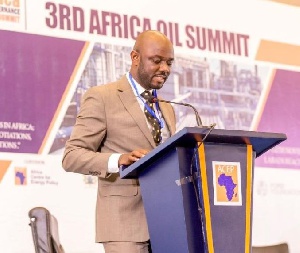 Benjamin Boakye, Executive Director of ACEP
Benjamin Boakye, Executive Director of ACEP
Energy sector players are pushing for a paradigm shift in the industry post-COVID-19, whereby African countries will embark on massive infrastructural investment to ensure they can weather a future pandemic situation like the world is facing now.
Speaking during a webinar on “Covid-19 Response Strategies in Africa’s Oil and Gas Industry”, organised by the Africa Centre for Energy Policy (ACEP), Benjamin Boakye, the Executive Director of the centre, said this new normal provides opportunities for the continent.
“For instance, where gas is stranded in Nigeria and it is relevant for consumption in Ivory Coast or Ghana, how do we integrate infrastructure to be optimal at dispatching some of the hydrocarbons to these countries—so that where transportation is becoming difficult we can send it through pipelines.
“We need to provide infrastructure to ensure that, going forward, African countries can adapt to a pandemic situation like this in the future,” he said.
Panellists on the webinar included representatives of national oil companies on the continent, who discussed what their various countries were doing to mitigate the impact of the pandemic.
Leparan Morintat, Chief Executive Officer of the National Oil Corporation of Kenya, said although the company has had its share of the virus’ impact, management had to think outside the box to adopt measures to ensure the smooth running of the company.
“We lobbied the government to classify petroleum companies as essential to enable our workers to move so that our operations would not be halted. We also made about 90 percent of our staff to work from home—so technology became very important to our daily work.
“But what we found not to be appropriate that we had to stop is our exploration activity on block 14 T. We actually deferred our operation, so everyone who was working there was recalled back to their family till the virus is controlled in Kenya,” he added.
James D. Yamaoh, the acting Chief Operating Officer of the Ghana National Petroleum Corporation, said there is very depressing demand for fossil fuel amid low foreign direct investment and a low oil price, which has affected the corporation’s revenue.
He said the drop in oil revenue has affected the share that the government gives to the GNPC, and what was budgeted for them has subsequently been slashed.
“In all this we have to renew our emphasis on diversification of energy sources and alternate revenue streams that, going forward, will help us as a national oil company.”
Crude oil prices have been collapsing since the outbreak of the coronavirus disease, dropping from more than US$60 per barrel before the pandemic to just about US$40 presently.
The International Energy Agency (IEA) has raised its annual forecast for crude demand to 92.1m barrels per day, up 400,000 barrels a day from its outlook last month, citing a smaller-than-expected second-quarter decline as lockdowns are eased in many countries.
The agency said “the large and, in some countries, accelerating number of COVID-19 cases is a disturbing reminder that the pandemic is not under control and the risk to our market outlook is almost certainly to the downside.”